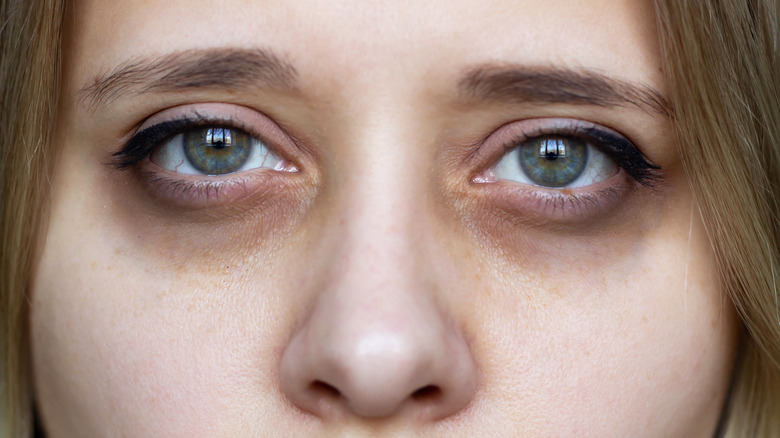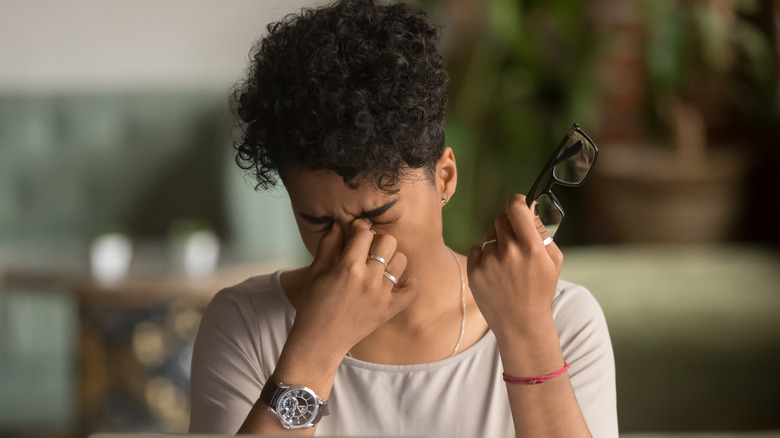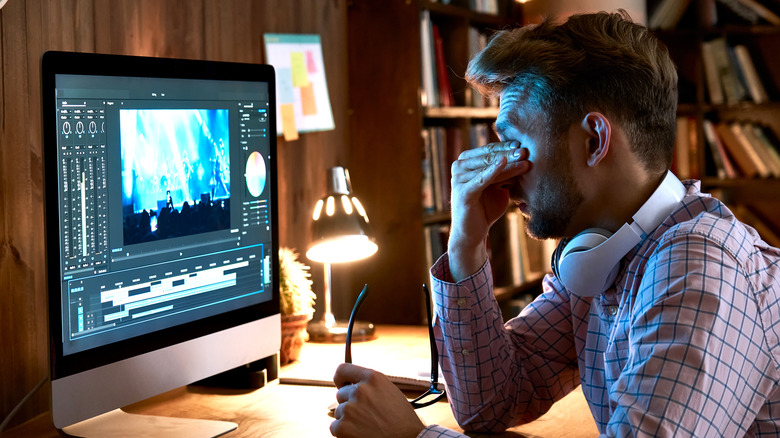This Is What Happens To Your Eyesight When You Don't Get Enough Sleep
Sleep is essential for our health and well-being. When you're not sleeping enough, it can affect your work, relationships, and physical health (via National Institutes of Health). Your thinking and memory can be impaired when you lack sleep, and you also might notice how it disrupts your weight loss efforts. Another way inadequate sleep can impact your life is that it can strain your vision.
According to Eye Health Northwest, your eyes need at least five hours of sleep each night. During these critical hours, your eyes heal (via American Academy of Sleep Medicine). You might notice if you don't get enough sleep, your eyes might be dry, itchy, or red. That's because they didn't have sufficient time to produce enough tears, which could eventually lead to eye infections. You could also experience eye twitches, light sensitivity, or blurred vision after a night of inadequate sleep.
A 2008 study published in Sleep found that professional drivers with 27 hours of sleep deprivation had slower reaction times and made critical errors in processing visual information.
If you don't make a habit of getting a good night's sleep, it could also lead to glaucoma, where you could lose your vision (via American Academy of Sleep Medicine).
Improving sleep-related eye issues
Every once in a while, we all miss out on a night of good sleep. But by taking a look at some of your habits during the day, you could better protect your eyes and work on your sleep hygiene.
According to the Piedmont Eye Center, the blue light from our electronic screens overstimulates the eyes and affects sleep. Between 30 minutes and two hours before bedtime, put away your phone and turn off the television.
If you wear contact lenses, be sure to take them out before you go to bed. Although some contact lenses are made to sleep in, removing them allows your eyes to get oxygen and moisture.
Exercise stimulates blood flow and balances the fluids in your body, including your eyes (via Piedmont Eye Center). Exercise can also reduce the time it takes to fall asleep each night, which improves your sleep quality. Just be sure not to schedule that high-intensity workout just before bedtime (via Sleep Foundation).
It's also helpful to keep a set sleep schedule so your body can establish a sleep/wake rhythm (via Piedmont Eye Center).
How to reduce eye strain
Do your eyes feel tired during the day despite getting a good night's sleep? There are a few small adjustments you can make to reduce the strain on your eyes, according to Mayo Clinic.
First of all, consider the lighting in your home or office. If you're reading a book or working on something close to your eyes, a light from behind directed to the book or object in front of you will help with eye strain.If you're working at a desk, have a light with a shade in front of you. You'll want to avoid any light going directly into your eyes. That means avoiding having your computer facing a window. Lights above your head or behind you can also create a harsh glare on your computer screen that can create a strain on your eyes.
If you work at a computer, take breaks every 20 minutes and find something 20 feet away to look at for at least 20 seconds.
If you experience dryness in your eyes, use artificial tears eye drops — not ones for eye redness. Using eye drops frequently, even when your eyes feel fine, will keep your eyes lubricated. You'll want to use preservative-free eye drops so your eyes don't develop a sensitivity to the preservatives.



